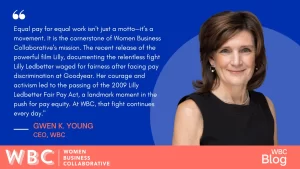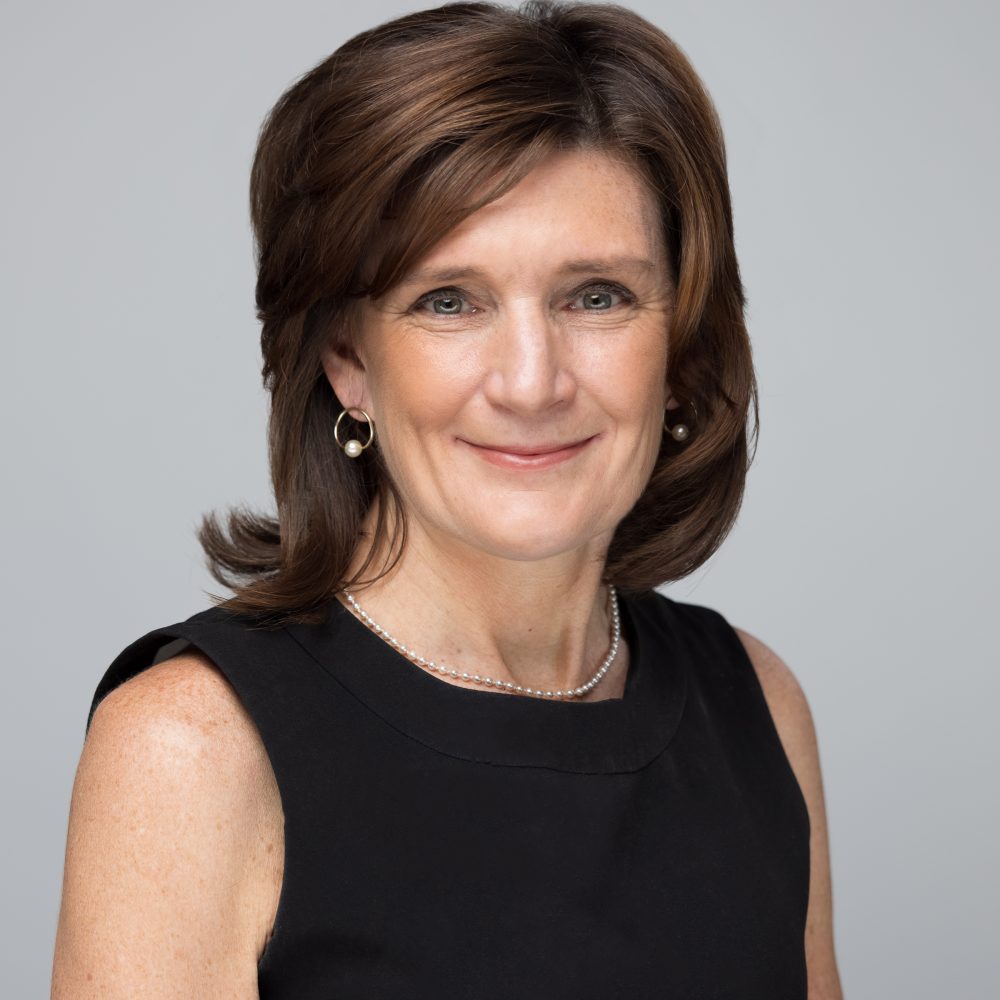
Equal Pay for Equal Work: Fighting On
June 26, 2025

While Women’s Business Collaborative (WBC) is always at the forefront of battling for “equal pay for equal work,” the pay gap for women was especially on my mind during the last few weeks.
It was triggered by the release of the movie, Lilly, a brilliant film based on the life of pay equity advocate Lilly Ledbetter, who fought tirelessly against unfair treatment while working at a Goodyear facility in Alabama, where she sued the company after she discovered she was being paid significantly less than her male colleagues for the same work, after working there for 19 years. After winning her lower court case, only to be over-turned by the Supreme Court, she battled on when the only option for equal pay for equal work was a Congressional bill. Finally in 2009, Congress passed, and President Obama signed the Lilly Ledbetter Fair Pay Act.
I was delighted to host several WBC events to honor the film’s producers and directors, and to showcase the importance of Lilly Ledbetter and this film. She passed away in 2024, but her name is forever immortalized as a warrior and crusader for equal pay for women. We at WBC are privileged to keep the battle going.
Far from there yet
Despite great strides thanks to Lilly’s efforts and the resulting legislation, 16 years later pay equity is far from a reality for women. On average, women continue to earn 84 cents for every dollar their male counterparts make. The numbers are even worse for women of color, with Black women and Latinas earning 66 cents, and 59 cents respectively when compared to white, non-Hispanic men.
Action steps to move the needle on gender pay equity:
Adapt existing policies and processes to:
- Prohibit retaliation or discrimination against employees who disclose or discuss salaries
- Not inquire about previous salary history while recruiting
- Include salary ranges in all job postings
- Disallow salary negotiation for new hires unless predetermined pay bands are published
Conduct and publish analyses of raw and adjusted pay for underrepresented populations, wherever it is legally permitted
- Include part-time, contract, and full-time workers, as well as temporary hires made through third-party staffing agencies.
Report progress annually - Set aside funds to support the work the company is doing to equalize pay
Publish the number and percentages of women and minorities in each pay band.
- Develop and use objective criteria to determine pay standards (salary ranges or “levels”)
- Ensure criteria can be backed up by an accessible pay calculator
- Be transparent about both methodology and findings
A Final Note: Watch the Movie
Lilly is now out in theatres and streaming on a number of platforms, including Amazon Prime. It is enlightening, inspiring and entertaining, with an Oscar-worthy performance by Patricia Colson in the title role.
As I watched Lilly, I was heartened that she realized she couldn’t do it alone and joined forces with like-thinking women and men. It reinforced for me our WBC mantra of #FasterTogether, and the unwavering importance of a collaborative approach to achieving gender pay equity. Many are in the trenches with us. Hope you will be too!
Gwen Young
CEO, WBC
P.S.: It’s important to note that none of Lilly Ledbetter’s actions following the Supreme Court loss, did anything to overturn the ruling against her. She fought the fight for other women.
Author
-

Gwen K. Young is the CEO of the Women Business Collaborative. She is also a Visiting Scholar at the Elliot School of International Affairs, George Washington University and former Director of the Global Women’s Leadership Initiative at the Wilson Center. She is an Advisor to Concordia. Ms. Young has worked across the globe to promote economic development, good governance and peace. She has developed strategy, programming and advocacy in the areas of humanitarian policy, international affairs and international development. This includes developing public private partnerships focused on public health, agriculture, gender equality, and access to finance. Further, Ms. Young has advocated for and published on international criminal law and designed SGBV guidelines. As an attorney, Ms. Young has worked as a professional advocate for women and human rights in corporate law settings, with the ICTY and the Kroc Institute for Peace and Justice at the University of San Diego. Her career has encompassed a comprehensive array of international organizations including the Bill & Melinda Gates Foundation, Medecins Sans Frontieres, International Rescue Committee, and the Harvard Institute for International Development. An alumna of Smith College, Harvard’s Kennedy School of Government and the University of California Davis, School of Law, Ms. Young has pursued a career of international public service focused on humanitarian relief, international development, and human rights starting with gender equality and equity.
View all posts

